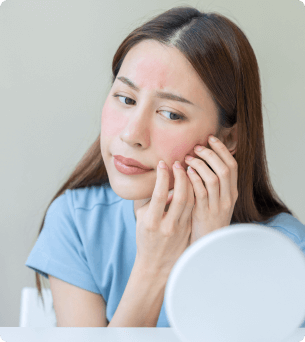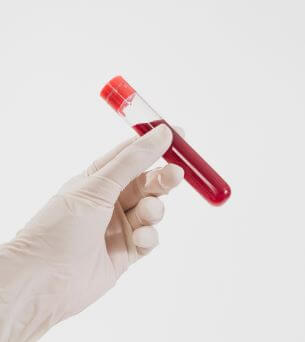Allergic reactions are a common issue affecting people of all ages. Whether it’s hay fever, a food allergy, or an allergy to dust mites, allergies can have a significant impact on daily life. If you have an allergy yourself or know someone dealing with allergies, it’s helpful to be informed about what to do when someone has an allergic reaction. An allergy is not the same as an intolerance. In this blog, we will discuss essential information about allergies, allergic reactions, and intolerances so that you are fully aware of this prevalent issue.

What is an allergy and an allergic reaction?
An allergy is an abnormal response of the immune system to a substance that is normally harmless. Normally, the immune system should only respond to substances that are harmful, such as bacteria and viruses, which can make us sick. However, in an allergic reaction, the immune system responds to a substance that is typically harmless. This substance, known as the allergen, can come from a wide range of sources, including food, pollen, pets, medications, and more. When the immune system comes into contact with the allergen, it produces various substances that cause an allergic reaction. An allergic reaction is a complex cascade of events that can lead to various symptoms and discomfort.
The duration of an allergic reaction varies and depends on the severity and type of allergy. In mild cases, symptoms may last for a few hours, while severe reactions can last much longer.
According to data from Statistics Netherlands (CBS), an estimated more than 4 million people in the Netherlands suffer from allergies, which equates to about 1 in 4 people. The most common allergies in the Netherlands are hay fever, dust mite allergy, food allergy, and insect allergy.

What is the difference between allergy and intolerance?
Allergy and intolerance are two distinct reactions of the body to certain substances, but it’s important to understand the difference between them.
An allergy is an abnormal response of the immune system to a specific substance, such as pollen, pets, or medication. The immune system perceives this substance as a threat and reacts with an allergic response, like rash, itching, and redness. Allergies can, in some cases, be severe or even life-threatening, as in the case of anaphylaxis.


On the other hand, intolerance is not a response of the immune system; thus, no antibodies are produced against the allergen. In intolerance, the body cannot process a particular component of a food item well, such as lactose or gluten. This reaction may occur days later, leading to symptoms like abdominal pain, diarrhea, bloating, and nausea. Unlike allergies, intolerances are usually not life-threatening but can cause discomfort and inconvenient symptoms.
Related tests


How does an allergy develop?
Allergic reactions occur when the body’s immune system overreacts to a non-harmful substance. The immune system typically has the task of protecting the body against harmful invaders, such as bacteria and viruses. However, in people with allergies, the immune system also responds to non-harmful substances known as allergens.
The development of an allergy can have various causes. Heredity plays a role, meaning that individuals have a higher likelihood of developing allergies if allergies are present in their family. This doesn’t necessarily mean developing the same allergies as one’s family, but it does increase the likelihood of developing an allergy.
Furthermore, exposure to allergens at a young age plays a role in the development of allergies. When born, the immune system is still ‘blank.’ We observe that children in the Western world develop more allergies than children in developing countries. This is likely because children in developing countries encounter a variety of pathogens, leading to the proper development of the immune system. When the immune system is less ‘stimulated,’ due to good hygiene practices as seen in developed countries, there is a greater chance of the immune system overreacting, resulting in the development of an allergy.
Allergy symptoms
Allergic reactions can cause a wide range of symptoms, ranging from mild to severe; this can vary from person to person but also depends on the physical location where the allergic reaction occurs and the type of allergic response. First, we will discuss the general symptoms of an allergic reaction and then delve deeper into common allergens and their specific symptoms.
The general symptoms of an allergic reaction include:
- Allergic skin reaction:
the skin itches, may turn red, and small bumps (hives) may develop.
- Allergic reaction in the eyes:
the eyes may become red, itchy, watery, and give a burning sensation.
- Allergic reaction in the face:
swelling of the face, itchy eyes and nose, and skin rash.
- Respiratory problems:
increased mucus production can lead to sneezing, a runny nose, coughing, and – in severe cases – difficulty breathing and wheezing.
- Gastrointestinal complaints:
abdominal pain, nausea, vomiting, diarrhea.



In the case of a severe allergy, an anaphylactic reaction can occur. This is a life-threatening reaction where the allergen causes symptoms such as severe swelling of the face, breathing difficulties due to swelling of the throat, and, in severe cases, low blood pressure and loss of consciousness. When this happens, someone should receive adrenaline as soon as possible to stop the reaction. Fortunately, this type of reaction does not occur frequently.


Specific allergens can lead to specific reactions.
- Insect bites, such as from mosquitoes and wasps, can cause swelling, redness, and itching.
- Detergents, hair dye, and other cosmetics can trigger skin reactions.
- Also, pets, such as dogs and cats, can cause mucous membrane reactions such as a runny nose, itchy eyes, skin reactions, and itching.
Not all allergic reactions require medical attention. In the case of mild allergic reactions, it is sufficient to take self-care measures. If there are repeated severe reactions or if someone has had an anaphylactic reaction, hospital investigations will be conducted to identify the specific allergen.




Allergy testing
The most common tests are the skin prick test and the IgE determination in the blood. In the skin prick test, small drops of allergens are applied to the skin, after which the skin is lightly scratched. If there is an allergy, a reaction will occur, such as redness or swelling at the prick site. The specific IgE determination measures the presence of allergy-specific antibodies in the blood.
It is important to note that allergy tests often yield false-positive results. This means that the test may indicate that you are allergic, but this does not necessarily mean that you actually experience symptoms of this allergy. Therefore, it is advisable to perform allergy tests only when someone has severe allergic symptoms, when it is challenging to avoid the allergen, or when the allergen is unknown.


Treatment and prevention of allergies
When you are allergic to something, it is important to avoid the substances you are allergic to. Therefore, it is essential to know which substances or agents cause an allergic reaction in you, so you can avoid them. Medications can also help reduce symptoms, such as antihistamines (in tablet form, eye drop form, or nasal spray form) for itching and sneezing. If someone has had a very severe allergic reaction, an anaphylactic reaction, adrenaline may be prescribed, which can be used when such a severe reaction occurs again. In cases of severely disabling allergic reactions, immunotherapy may be considered. This is a specialized treatment in the hospital where you gradually receive increasing amounts of the allergenic substance to help your body get used to it. It is important to work with your doctor to develop a plan that suits your situation because each allergy and reaction requires a different approach.

Conclusion
Allergic reactions are a common problem and can have a significant impact on people’s daily lives. Identifying allergens, avoiding triggers, and taking the right medication are crucial in reducing symptoms. Undergoing allergy tests can help identify specific allergens and create a personalized treatment plan, but it is not always necessary. Consulting with a doctor is, therefore, always advisable for an accurate diagnosis and personalized treatment. Through a good understanding of allergies and the implementation of preventive measures, people with allergies can achieve a better quality of life and minimize discomfort.








